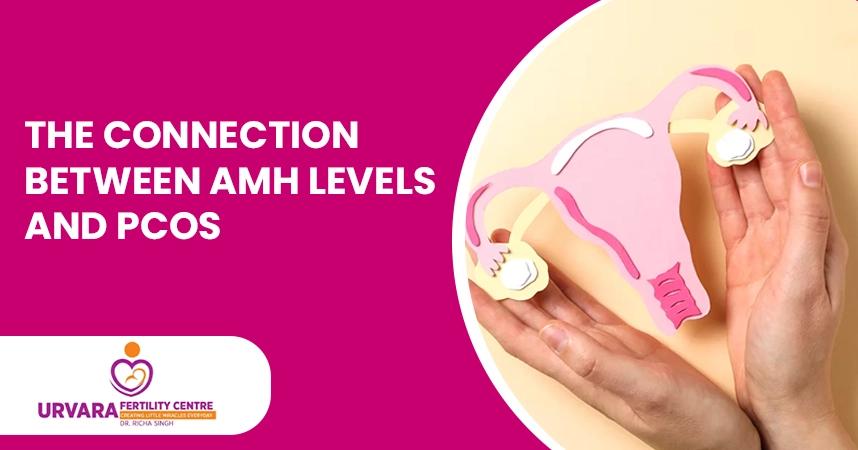
The Connection Between AMH Levels and PCOS
Understanding the connection between anti-Müllerian hormone (AMH) levels and polycystic ovary syndrome (PCOS) is important for anyone dealing with fertility issues.
AMH, a hormone produced by ovarian follicles, plays an important role in assessing ovarian reserve. Women with PCOS often have high AMH levels, which may indicate an increased number of follicles but may also indicate potential complications.
This blog will highlight the complex relationship between AMH levels and PCOS, and how these hormone levels can impact diagnosis, treatment, and overall fertility.
Whether you’ve recently been diagnosed with PCOS or you’re looking for fertility treatments, this guide will provide clear and simple information to help you understand how AMH levels play a role in your reproductive health.
Understand AMH and Its Role in Reproductive Health
Anti-Müllerian hormone (AMH) is a substance produced by granulosa cells in ovarian follicles. It serves as a marker for ovarian reserve, meaning it indicates the number of eggs a woman has left. In terms of reproductive health, AMH levels provide valuable information about fertility.
Women with high AMH levels typically have more ovarian follicles, which can be an advantage when trying to conceive. However, extremely high levels of AMH, as seen in many women with polycystic ovary syndrome (PCOS), can be a double-edged sword.
Read Also Detail About: Understanding AMH: A Useful Hormone in Women
What is Polycystic Ovary Syndrome (PCOS)?
Polycystic ovary syndrome (PCOS) is a common hormonal disorder affecting women of reproductive age. It is characterized by irregular menstrual cycles, elevated androgen levels (male hormones) and the presence of multiple small cysts on the ovaries.
These cysts are actually immature follicles that are not mature enough to be released during ovulation. One of the major symptoms of PCOS is increased levels of AMH, which is related to the increased number of follicles.
The Connection Between AMH Levels and PCOS
AMH levels in women with PCOS are often significantly higher than those in women without the condition. This is because women with PCOS have more antral follicles in their ovaries.
The more follicles present, the higher the AMH levels. While high AMH levels may indicate a strong ovarian reserve, in the case of PCOS, it reflects an excessive production of follicles that fail to mature properly.
Why AMH Levels Matter in PCOS Diagnosis
AMH levels can be used as a diagnostic marker for PCOS, especially when combined with other clinical features such as irregular menstrual cycles and high androgen levels. Measuring AMH levels can help healthcare providers determine the severity of PCOS and create treatment plans accordingly.
For example, a woman with very high AMH levels may need a different approach to fertility treatment than a woman with low levels.
How AMH Levels Affect Fertility in Women with PCOS
Although high AMH levels in PCOS patients indicate a large number of eggs, these eggs may not be of optimal quality.
Immature follicles often cause problems with ovulation, which can result in infertility. Women with PCOS may also have reduced ovulation or not ovulate at all, making it more challenging to conceive.
However, with proper treatment, including medications that induce ovulation, many women with PCOS can have successful pregnancies.
Managing PCOS and AMH Levels
Managing PCOS involves addressing the symptoms and underlying hormonal imbalances.
Treatment options may include lifestyle changes, such as diet and exercise, medications to regulate menstrual cycles, and fertility treatments if pregnancy is the goal.
Monitoring AMH levels can provide information about how well these treatments are working, and guide treatment adjustments.
The Role of AMH in Fertility Treatments
For women with PCOS who are undergoing fertility treatments such as in vitro fertilization (IVF), AMH levels are important in guiding the treatment process.
High AMH levels may indicate a higher risk of ovarian hyperstimulation syndrome (OHSS), a condition in which the ovaries become swollen and painful.
Hence, fertility specialists at Urvara Fertility Centre closely monitor AMH levels to optimise treatment outcomes and minimise risks.
Read Also: How AMH Levels Affect IVF Success Rates
FAQs About AMH and PCOS
1. What does a high AMH level mean for someone with PCOS?
High AMH levels in PCOS indicate an increased number of ovarian follicles, which can lead to irregular ovulation and fertility challenges.
2. Can AMH levels predict fertility success in PCOS patients?
AMH levels help assess ovarian reserve but do not directly predict fertility success. Other factors, such as egg quality, also play a role.
3. How can PCOS be managed to improve fertility?
PCOS can be managed with lifestyle changes, medications, and fertility treatments such as ovulation induction or IVF.
4. Do all women with high AMH have PCOS?
Not necessarily. High AMH levels can also be seen in women without PCOS, but it is a common symptom in women with the condition.
5. Can AMH levels change over time in women with PCOS?
Yes, AMH levels can fluctuate due to age, treatment, or changes in ovarian function.
Conclusion
Understanding the relationship between AMH levels and PCOS is essential for managing fertility and reproductive health. While high AMH levels are a common feature of PCOS, they present both challenges and opportunities in the journey towards conception. With personalized treatment plans and expert guidance from fertility specialists, women with PCOS can deal with these complications and achieve their fertility goals.
Content Created By:

Cyberbizz Technologies
Team - Content Curator

